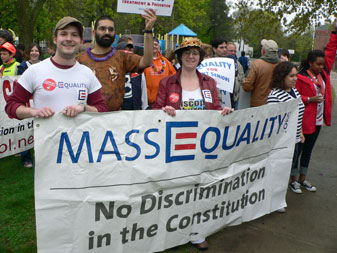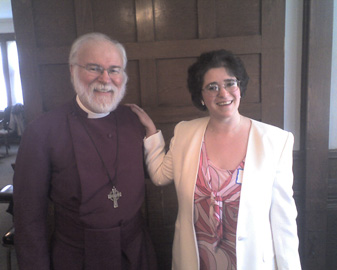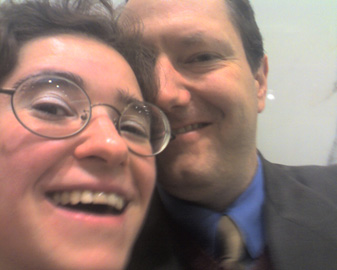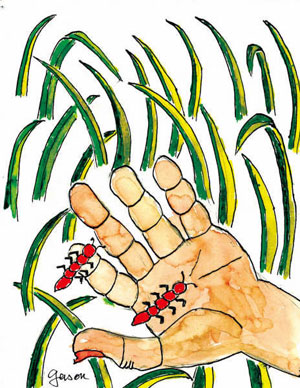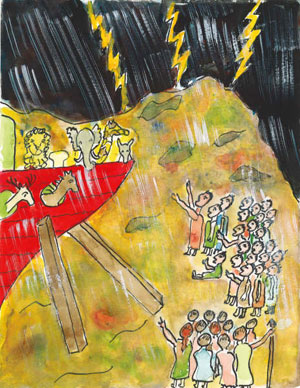Sara Pritchard’s first novel, Crackpots, won the prestigious Bakeless Prize from the Bread Loaf Writers’ Conference in 2002. I’ve put the book on my wish list after savoring this hilarious excerpt, “The Very Beautiful Sad Elegy for Bambi’s Dead Mother”, on her website. This is the story of a child who is doomed to become a writer, who relishes words with a physical delight, even (or especially) when she’s a little unclear on what they mean. My favorite part:
“I believe in the holey ghost, the holey Christian church, the communion of saints, the forgiveness of sins, the resurrection of the body, and the life everlasting, Hey men!” you say to yourself, bouncing a ball, walking Go-Jeff on a make-believe leash, jumping rope, hopping on one foot, skipping to school, whumping your slinky down the stairs. “The life everlasting, Hey men! The life everlasting, Hey Men! The holey Christian church. The holey Christian church. The holey-moley, roley-poley, holey Christian church.”
Now it’s Thanksgiving vespers, and after your favorite poem, the Apostles’ Creed, everyone is singing one of your favorite hymns, “Bringing in the Cheese,” their voices happy and cheerful, their faces kind in the yellow light. Mrs. Kline, at the pipe organ, is trying to keep up, her crow wings flapping, her feet going one direction, her hands the other.
Bringing in the cheese, bringing in the cheese,
We shall come rejoicing, bringing in the cheese.
You stand next to Albertine in the children’s choir and sing as loud as you can, sort of shouting. You sing with your top lip curled under and your top teeth sticking out like a mouse because this is a hymn written by church mice, and you are pretending to be one of them as you sing. Gus and Jock—from Cinderella—probably had a part in composing this wonderful hymn. They probably know it by heart. They are probably singing it right now at the top of their lungs in one of the dark, echoing alcoves of Riverview Lutheran Church, maybe over to your right there behind the baptismal pot, standing on a big hunk of Swiss cheese.
The hymn is over. The congregation claps shut their hymnals, but everyone remains standing as Mason, an acolyte, puts out the altar candles with the big candlesnuffer on a pole. Reverend Creech raises his arms like he, too, is about to fly. “Let us pray,” he says, and then the beautiful words wash over you, the words you will always remember all the long days of your life and whisper to yourself when you’re afraid, when you’re alone, when all the sadness of being human gathers itself around you:
May the piece of God, which passeth all understanding,
keep your hearts and minds in Christ Jesus, Amen.
For many, many years you ponder just exactly which piece of God Reverend Creech might be referring to, but for now, you forget about all that because the choir is filing out and everyone is singing your very most favorite song in the whole world, the one your mother plays for you on the piano at bedtime, and your father has taught you and Albertine to sing in two-part harmony:
Now the day is over, night is drawing nigh,
Shadows of the evening steal across the sky.
Now the darkness gathers, stars begin to peep,
Birds and beasts and flowers soon will be asleep.
Thru the long night watches may thine angels spread
Their white wings above me watching ’round my bed
Grant to little children visions bright of Thee
Guard the sailors tossing on the deep blue sea.
Comfort every sufferer watching late in pain
Those who plan some evil, from their sin restrain
Jesus, give the weary calm and sweet repose
With thy tenderest blessing may my eyelids close.
* * * * *
1958—With very little coaxing and carrying, and only minor scratches, a big orange cat follows you and Albertine home from school. A big orange cat with silky fur and a big round pumpkin head. An orange cat who walks around the house rubbing her head on the legs of everything, including you. She walks in and out your legs, in and out, and her tail goes up your dress and makes you giggle.
“Our cat must have a very beautiful name,” Albertine announces. “Princess!” she exclaims. “Here, Princess! Here pretty Princess Kitty!”
“Kyrie Eleison!” you call, after the beautiful and mysterious words of the kyrie sung in church. “Here, Kyrie,” you call, crawling across the carpet toward your cat. “Here Kyrie! Kyrie Eleison!”
“Daisy,” Albertine says resolutely. “DAISY BUTTERCUP.”
“Here Dona, Here Dona,” you persist, “Here Dona Nobis Pacem!” and Albertine rolls her eyes so far back into her head they disappear completely. Only the whites—like Orphan Annie’s—show.
“Panis Angelicus?” you pout and beg, “Adeste Fideles? Agnus Dei?”
For many hours that night, you lie awake, wandering through the enchanted forest of all the words you know, bumping into trunks and branches, tripping over roots and stumps, searching for the perfect name for your beautiful orange cat: mimosa, marmalade, gladiola, peony, poppycock, forsythia, taffeta, pinochle, piano forte, aspen, pumpkinseed, Leviticus Numbers, lickety-split, fiddlesticks, Worcestershire, nincompoop, whippoorwill, whippersnapper, Fridgedaire, DeSoto, squirrel, pollywollydoodle all the day . . . and on and on. And then . . . lying on its back, humming “Row, Row, Row Your Boat,” kicking its feet and doing the back stroke around your brain, you find it: the perfect name for your cat. So you can go to sleep now. But come morning, you wake up in a panic because the perfect name you’ve now forgotten! You should have written it down! Your heart is racing: mimosa, gladiola, peony, forsythia, taffeta, squirrel . . . Oh, praise the Lord, there it is! You run downstairs, but . . .
Your cat is gone.
“He wanted out,” Mason mumbles, dripping a big, sloppy servingspoonful of Wheaties up to his mouth and never looking up from the cereal box he’s reading.
Visit Sara Pritchard’s website here to find out about her new collection of linked stories, Lately.
